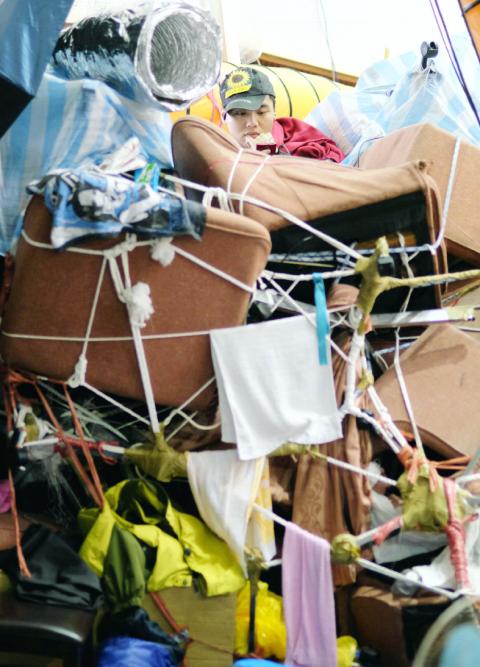The Ministry of the Interior said yesterday that any attempt to ask for donations for the Sunflower movement against the cross-strait service trade agreement would constitute a violation of the Political Donation Act (政治獻金法), which is punishable by a fine of twice the amount of money raised and the confiscation of all donations.
The ministry made the remarks one day after a Facebook page, titled “Repairing 318 Legislative Yuan,” was set up by netizens supportive of the Sunflower movement to solicit money for repairs to the damage inflicted to the legislative chamber during the protesters’ 24-day occupation.
The netizens planned to use the money to cover the rental fees for audio equipment installed inside and outside the legislature during the protest, which is scheduled to come to an end today.

Photo: Sam Yeh, AFP
Legislative Yuan staffers say the occupation has caused damage to chairs, doors, carpets, microphones, the broadcasting system and some valuable paintings.
“As the student movement is categorized as a political activity, any money donated to or raised for it will be deemed a political donation,” the ministry said, adding that only political parties, political associations and election candidates are allowed to accept political donations.
The ministry said student organizations that have claimed that their fund-raising attempts are for charitable purposes would have the legitimacy of their actions determined by the Control Yuan or the Ministry of Health and Welfare.
The ministry’s statement drew immediate criticism from netizens, some citing the more than NT$100 million (US$3.3 million) raised in 2006 by civic groups supporting a movement against then-president Chen Shui-bian (陳水扁) and accused the ministry of double standards.
“I wonder if anyone who solicited money for the movement at that time was ever fined,” a netizen wrote.
Separately yesterday, Legislative Yuan Speaker Wang Jin-pyng (王金平) said that as many “kind-hearted people” have expressed an intention to pay for the repairs, not a penny of taxpayers’ money would be used to cover the costs of the restoration work on the legislature.
Tsai Wei-min (蔡衛民) of the Legislative Yuan’s General Affairs Department on Tuesday turned down the offer by netizens to help to pay for the repairs.
Meanwhile, Executive Yuan spokesperson Sun Lih-chyun (孫立群) said yesterday that the Cabinet plans to seek NT$3 million compensation from the protesters who broke into and briefly took over the Executive Yuan compound on March 23.
Sun said the protesters destroyed four timber doors, 13 windows, a refrigerator, a photocopy machine, a fax machine, a cabinet, and several tables and chairs, which combined were worth NT$3 million.
“All the parties involved in the brief occupation have given their statements to police and have been summoned by prosecutors for questioning. We will file a civil lawsuit against them once prosecutors conclude their investigation,” Sun said.
Sun said that the Executive Yuan “is not currently considering” dropping the case against the protesters and “has not thought about” the possibility of accepting donations from businesses rather than asking the protesters to pay for the damage.
Additional reporting by CNA

Taiwan is projected to lose a working-age population of about 6.67 million people in two waves of retirement in the coming years, as the nation confronts accelerating demographic decline and a shortage of younger workers to take their place, the Ministry of the Interior said. Taiwan experienced its largest baby boom between 1958 and 1966, when the population grew by 3.78 million, followed by a second surge of 2.89 million between 1976 and 1982, ministry data showed. In 2023, the first of those baby boom generations — those born in the late 1950s and early 1960s — began to enter retirement, triggering

One of two tropical depressions that formed off Taiwan yesterday morning could turn into a moderate typhoon by the weekend, the Central Weather Administration (CWA) said yesterday. Tropical Depression No. 21 formed at 8am about 1,850km off the southeast coast, CWA forecaster Lee Meng-hsuan (李孟軒) said. The weather system is expected to move northwest as it builds momentum, possibly intensifying this weekend into a typhoon, which would be called Mitag, Lee said. The radius of the storm is expected to reach almost 200km, she said. It is forecast to approach the southeast of Taiwan on Monday next week and pass through the Bashi Channel

NO CHANGE: The TRA makes clear that the US does not consider the status of Taiwan to have been determined by WWII-era documents, a former AIT deputy director said The American Institute in Taiwan’s (AIT) comments that World War-II era documents do not determine Taiwan’s political status accurately conveyed the US’ stance, the US Department of State said. An AIT spokesperson on Saturday said that a Chinese official mischaracterized World War II-era documents as stating that Taiwan was ceded to the China. The remarks from the US’ de facto embassy in Taiwan drew criticism from the Ma Ying-jeou Foundation, whose director said the comments put Taiwan in danger. The Chinese-language United Daily News yesterday reported that a US State Department spokesperson confirmed the AIT’s position. They added that the US would continue to

The number of Chinese spouses applying for dependent residency as well as long-term residency in Taiwan has decreased, the Mainland Affairs Council said yesterday, adding that the reduction of Chinese spouses staying or living in Taiwan is only one facet reflecting the general decrease in the number of people willing to get married in Taiwan. The number of Chinese spouses applying for dependent residency last year was 7,123, down by 2,931, or 29.15 percent, from the previous year. The same census showed that the number of Chinese spouses applying for long-term residency and receiving approval last year stood at 2,973, down 1,520,